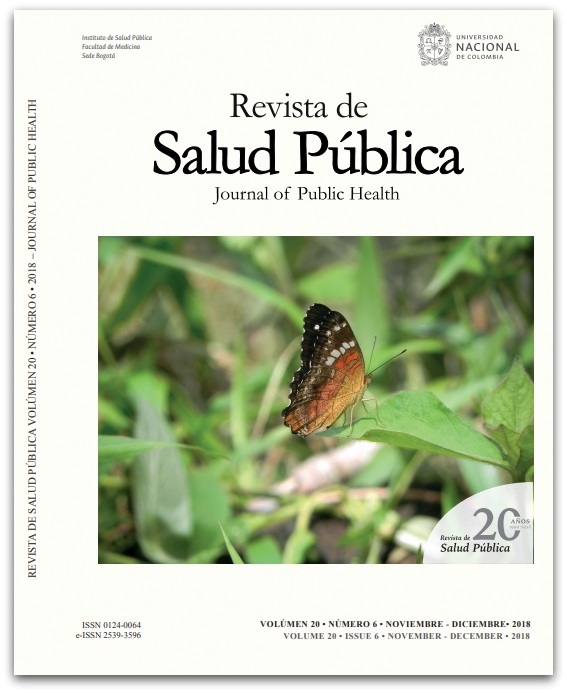La salud como derecho en el postconflicto colombiano
Health as a right in Colombia’s post-conflict period
DOI:
https://doi.org/10.15446/rsap.v20n6.67777Keywords:
Conflictos armados, guerra, derecho a la salud (es)Armed conflict, war, right to health (en)
Downloads
Objetivo Explorar los elementos que se deben considerar en las zonas de post-conflicto para garantizar el derecho a la salud de las poblaciones inmersas o vecinas a las zonas de concentración de los excombatientes.
Materiales y Métodos Se realizó un estudio retrospectivo, mediante búsqueda en bases de datos, obteniendo 26 artículos pertinentes.
Resultados Mediante la revisión documental se evidenció que no solo es importante el marco legal o normativo, se deben incluir las necesidades e intereses de las personas de la comunidad, tanto de la población civil como de las víctimas de la guerra, el derecho a la salud en estas zonas implica también ejercicios de poder, de dialogo de saberes, de perdón, no repetición y de respeto, se debe ofertar servicios de promoción de la salud y prevención de la enfermedad, tratamiento y rehabilitación basados en la estrategia de atención primaria en salud, es decir adaptados a las realidades culturales, los entornos y los quereres de las comunidades.
Conclusiones El reto es cómo dentro de un débil sistema de salud tanto en lo financiero, administrativo y técnico eso pueda ser posible. Se proponen los elementos básicos multidimensionales en el ámbito de la atención primaria en salud, para afrontar este reto de la salud pública colombiana.
Objective To explore the elements that should be considered in post-conflict zones to guarantee the right to health of populations immersed or living in areas near the concentrations of former combatants.
Materials and Methods A retrospective study was carried out by searching databases, obtaining 26 relevant articles.
Results The literature review made evident that not only the legal or normative framework is important, but also the needs and interests of the people of the community, of both the civilian population and the victims of war. The right to health in these areas also involves the exercise of power, of dialogue of knowledge, forgiveness, non-repetition and respect. In addition, health promotion and disease prevention services, treatment and rehabilitation based on the primary care strategy should be offered, that is, they should be adapted to the cultural realities, the environments and the interests of the communities.
Conclusions The challenge lies in the way how these goals can be achieved within a context of a weak health system, in financial, administrative and technical terms. Basic multidimensional elements in the field of primary health care are proposed to face this challenge for the Colombian public health.
References
Presidencia de la República de Colombia. Para la terminación del conflicto y la construcción de una paz estable y duradera. [Internet] República de Colombia. 2016. [Citado septiembre 13 de 2017] Disponible en: Disponible en: http://bit.ly/2EoN0io .
Ekman, E. La documentación en investigación educativa. Enciclopedia Internacional de la Educación 1989; vol. 3, págs. 1482-85.
Lorenzo Rodríguez, A, Martínez Piñeiro, AB, Martínez Piñeiro, E. Fuentes de información en investigación socioeducativa. [Internet] RELIEVE. Revista Electrónica de Investigación y Evaluación Educativa. 2004; 10(2):117-134. [Citado septiembre 13 de 2017] Disponible en: Disponible en: http://bit.ly/2WcPzOT .
Vicenç, F. Introducción a los procesos de paz. [Internet] (E. d. Pau, Ed.) Barcelona, Cataluña: Escola de Cultura de Pau. 2010 [Citado abril 28 de 2017]. Disponible en: Disponible en: http://bit.ly/2woVXnE .
Gonzalez, R. Análisis del proceso de paz en Irlanda del Norte. [Internet] Universidad Católica de Colombia- Universitá Degli Studi di Salerno. 2015. [Citado mayo 9 de 2017]. Disponible en: Disponible en: http://bit.ly/2JsR59q .
Guatemala, U. R. Acuerdos de paz de Guatemala. Guatemala: Universidad Rafael Landívar & Misión de Verificación de las Naciones Unidas en Guatemala (Eds.). Acuerdos de paz (2a. ed.). [Internet] Universidad Rafael Landívar y Misión de Verificación de las Naciones Unidas en Guatemala. 2007. [Citado mayo 9 de 2017]. Disponible en: Disponible en: http://bit.ly/2EpbY1n .
Ugalde, A. Conflict and health: The health costs of war: can they be measured? Lessons from El Salvador. BMJ 2000, 321(7254):169.
Morales, M. Interpretación académica del proceso de negociación política en El Salvador, a 13 años de la firma de los acuerdos de paz: 1992-2004. [Internet] Avizora 2004. [Citado mayo 18 de 2017]. Disponible en: Disponible en: http://bit.ly/2YzzsZc .
Silber, I. Mothers/Fighters/Citizens: Violence and Disillusionment in Post War El Salvador. Gender & History 2004, 16(3), 561-587.
Wood, E. Forging democracy from below: Insurgent transitions in South Africa and El Salvador. [Internet] Cambridge University Press 2000. [Citado mayo 25 de 2017]. Disponible en Disponible en http://bit.ly/2LWU0cy .
Caranci, C. Angola: termina la guerra de Savimbi el irreductible. [Internet] (A. Ediciones, Ed.) La aventura de la Historia 2002. (44): 18-24. [Citado mayo 27 de 2017]. Disponible en: Disponible en: http://bit.ly/2M1KoNV .
Organización Mundial de la Salud OMS. Las repercusiones de los conflictos armados sobre los niños. Resolución 48/157 OMS. [Internet] Washington: OMS 1996. [Citado junio 9 de 2017]. Disponible en: Disponible en: http://bit.ly/30z70sd .
Sousa, C. A. Individual and Collective Dimensions of Resilience With in Political Violence. [Internet] Trauma, violence & abuse 2013, vol 14, issue 3, pp 235-254. [Citado junio 9 de 2017]. Disponible en: Disponible en: http://bit.ly/2VVUoN2 .
Cummings, E. Children and Political Violence from a Social Ecological Perspective: Implications from Research on Children and Families in Northern Ireland. [Internet]. Clinical Child and Family and Pshychology Review 2009, 12 (1) pp 16-38. [Citado junio 9 de 2017]. Disponible en: Disponible en: http://bit.ly/2VZKt9u .
Cummings, E. Bidirectional Pathways Between Exposure to Political Violence and Adolescent Adjustment in Northern Ireland. [Internet] J Clin Child Adolesc Psychol. 2017, (20): 1-10. [Citado junio 15 de 2017]. Disponible en: Disponible en: http://bit.ly/2MaiZtg .
Avila, C. R. Guatemala, Análisis del Sistema de Salud. [Internet] Guatemala: USAID 2015. [Citado julio 9 de 2017] Disponible en: Disponible en: http://bit.ly/2wcCWEY .
Herrera W. Mental disorders and the internal armed conflict in Guatemala. [Internet]. Actas Esp Psiquiatr.2005. Jul-Aug; 33(4):238-43. [Citado julio 10 de 2017]. Disponible en: Disponible en: http://bit.ly/2JVZvFZ .
Zur J. The psychosocial effects of "La Violencia" on widows of El Quiche, Guatemala. [Internet]. Focus Gend. 1993. Jun; 1(2):27-30. [Citado julio 10 de 2017]. Disponible en: Disponible en: http://bit.ly/30wHDao .
Acosta, M. S. Sistema de salud de El Salvador. [Internet]. Salud Pública de México 2011. 53(Supl. 2), 188-196. [Citado julio 13 de 2018]. Disponible en: Disponible en: http://bit.ly/2HHmMsp .
Organización Panamericana de la Salud OPS. El Salvador en el camino hacia la cobertura universal de salud: Logros y desafíos. [Internet]. San Salvador: OPS 2014. [Citado julio 13 de 2017]. Disponible en: Disponible en: http://bit.ly/2EoujeV .
Farias P. Emotional distress and its socio-political correlates in Salvador an refugees: analysis of a clinical sample. [Internet]. Cult Med Psychiatry 1991, Jun; 15(2):167-92. [Citado junio 11 de 2017]. Disponible en: Disponible en: http://bit.ly/2QenBgh .
Hume, M. The myths of violence: gender, conflict, and community in El Salvador. [Internet]. Latin American Perspectives 2008, 35(5), 59-76. [Citado julio 11 de 2017]. Disponible en: Disponible en: http://bit.ly/2VTPXm6 .
Banco Mundial. World Development Indicators 2011. New York. [Internet]. WB 2011. [Citado junio 10 de 2017] Disponible en: Disponible en: http://bit.ly/2YHDGOy .
Djimeu, E. The impact of social action funds on child health in a conflict affected country: evidence from Angola. [Internet].Soc Sci Med 2014. Apr;106:35-42. [Citado julio 2017]. Disponible en: Disponible en: http://bit.ly/2Qgo8ya .
Avogo, W. A. Forced migration and child health and mortality in Angola. [Internet]. Soc Sci Med 2010. Jan; 70(1):53-60. [Citado julio 2017]. Disponible en: Disponible en: http://bit.ly/2Wg3raT .
Agadjanian, V. P. Civil war and child health: regional and ethnic dimensions of child immunization and malnutrition in Angola. [Internet]. Soc Sci Med. 2003. Jun; 56(12):2515-27. [Citado julio 2017]. Disponible en: Disponible en: http://bit.ly/2w8G6cK .
Stedman, S. R. Ending Civil Wars: The Implementation of Peach Agreements. [Internet]. The International Peace Academy 2002. [Citado junio 10 de 2017]. Disponible en: Disponible en: http://bit.ly/2EmzfRu .
Ertl, V. S. Drinking to ease the burden: a cross-sectional study on trauma, alcohol abuse and psychopathology in a post-conflict context. [Internet] BMC Psychiatry 2016, 16, 2002. [Citado en junio 10 de 2017]. Disponible en: Disponible en: http://bit.ly/2HLJDTv .
Saile, R. E. Children of the postwar years: A two-generational multilevel risk assessment of child psychopathology in northern Uganda. [Internet] Development and Psychopathology 2016, 28(2), 607-620. [Citado julio 18 de 2017]. Disponible en: Disponible en: http://bit.ly/2QgpgBU .
Saile, R. E. Does war contribute to family violence against children? Findings from a two-generational multi-informant study in North. [Internet] Child Abuse Negl. 2014, Jan; 38(1):135-46. [Citado julio 19 de 2017] Disponible en: Disponible en: http://bit.ly/2WVMlwl .
Betancourt, T. M.-O. Interventions for children affected by war: An ecological perspective on psychosocial support and mental health care. [Internet]. Harvard Review of Psychiatry. 2013. 21, 3-8. [Citado julio 18 de 2017] Disponible en: Disponible en: http://bit.ly/30BD8eM .
Urdinola, BP. La guerra no es saludable. Violencia política y sus efectos en la salud infantil en Colombia. [Internet] Rev. Salud Pública (Bogotá) 20(3):326-33, [Citado el 21 de abril de 2019] Disponible en: Disponible en: http://bit.ly/2EnFCnF .
Cepeda-Rodriguez, E. H., Pérez-Niño, W. F. Derechos sociales y justicia transicional: experiencias internacionales y el caso colombiano. [Internet] Revista Mexicana de Ciencias Políticas y Sociales, 64(235): 77-107, 2019. [Citado 22 de abril 2019] Disponible en: Disponible en: http://bit.ly/2JxOFXj
How to Cite
APA
ACM
ACS
ABNT
Chicago
Harvard
IEEE
MLA
Turabian
Vancouver
Download Citation
CrossRef Cited-by
1. Cesar Garcia-Balaguera, Mery Gireth Vargas Martínez, David Alejandro Guzmán Arbelaez, Valentina Montenegro Fernandez. (2024). Maternal Mortality, Health Determinants, and Covid-19 in the Department of Meta, Colombia: A Cross-sectional Study. The Open Public Health Journal, 17(1) https://doi.org/10.2174/0118749445277442240220101010.
2. Sandra-Milena Montoya-Sanabria. (2020). Rurality as an analytic category: implications for public health. Revista de Salud Pública, 22(6), p.1. https://doi.org/10.15446/rsap.v22n6.91280.
Dimensions
PlumX
Article abstract page views
Downloads
License
Copyright (c) 2019 Revista de Salud Pública

This work is licensed under a Creative Commons Attribution 4.0 International License.
This journal provides immediate free access to its content under the principle that making research available to the public free of charge supports a greater exchange of global knowledge.
All contents of this journal, except where identified, are published under a Creative Commons Attribution 4.0 License




















